- Home
- H. P. Lovecraft
Writings in the United Amateur, 1915-1922 Page 9
Writings in the United Amateur, 1915-1922 Read online
Page 9
THE UNITED AMATEUR
OFFICIAL ORGAN OF THE UNITED AMATEUR PRESS ASSOCIATION
VOLUME XV GEORGETOWN, ILL., JUNE, 1916 NUMBER 11
DEPARTMENT OF PUBLIC CRITICISM
=The Coyote= for July opens with Harry E. Rieseberg's verses entitled"The Sum of Life", whose structure is excellent as a whole, thoughdefective in certain places. The word "mirage" is properly accented onthe second syllable, hence is erroneously situated in the first stanza."A mirage forever seeming" is a possible substitute line. Other defectsare the attempted rhymes of "decay" with "constancy", "carried" with"hurried", and "appalled" with "all". The metre is without exceptioncorrect, and the thoughts and images in general well presented,wherefore we believe that with a little more care Mr. Rieseberg canbecome a very pleasing poet indeed. "The Philippine Question", by EarlSamuel Harrington, aged 15, is an excellent juvenile essay, andexpresses a very sound opinion concerning our Asiatic colonies. It isdifficult to be patient with the political idiots who advocate therelinquishment of the archipelago by the United States, either now or atany future time. The mongrel natives, in whose blood the Malay strainpredominates, are not and never will be racially capable of maintaininga civilized condition by themselves. "How Fares the Garden Rose?" is apoem bearing the signature of Winifred Virginia Jordan, which is asufficient guarantee of its thorough excellence. "To a Breeze", also byMrs. Jordan, is distinguished by striking imagery, and displays in theepithet "moon-moored", that highly individualistic touch which ischaracteristic of its author. "Peace", by Andrew Francis Lockhart, is apoem of excellent construction, though marred by two serious misprintswhich destroy the harmony of the first and third lines.
* * * * *
=The Dixie Booster= for March-April is an exceedingly neat and cleverpaper from the House of Nixon. "Spring in the South", a poem by Maude K.Barton, opens the issue in pleasant fashion, the attractive images wellatoning for certain slight mechanical deficiencies. "Dick's Success", byGladys L. Bagg, is a short story whose phraseology exhibits considerabletalent and polish. The didactic element is possibly more emphasized thanthe plot, though not to a tedious extent. Whether or not a rough draftof a novel may be completed in the course of a single afternoon, a featdescribed in this tale, we leave for the fiction-writing members of theUnited to decide! Of the question raised regarding the treatment of theIndian by the white man in America it is best to admit in the words ofSir Roger de Coverly, "that much might be said on both sides". Whilstthe driving back of the aborigines has indeed been ruthless andhigh-handed, it seems the destiny of the Anglo-Saxon to sweep inferiorraces from his path wherever he goes. There are few who love the Indianso deeply that they would wish this continent restored to its originalcondition, peopled by savage nomads instead of civilized colonists. "TheDeuce and Your Add", by Melvin Ryder, is a bit of light philosophy whoseallegorical case is well maintained. "To a Warbler", by Roy W. Nixon, isa meritorious piece of verse whose rhythm moves with commendablesprightliness, though the first line of the first stanza might be madeto correspond better with the first line of the second stanza. The word"apparent" in the last line, seems a little unsuited to the generalstyle of the poem, being more suggestive of the formal type ofcomposition. "Grandma", also by Mr. Roy Nixon, is a noble sonnet whosequality foreshadows real poetical distinction for its author. "You", byDora M. Hepner, contains sublime images, but possesses metricalimperfections. The general anapaestic or dactylic rhythm is muchdisturbed by the iambic fourth line of the first stanza. The editorials,jokes, and jingles in this issue are all clever, and proclaim Mr.Raymond Nixon as a capable and discriminating editor.
* * * * *
=Literary Buds= for February exhibits the amateurs of Harvey, Illinois,after a long absence from the publishing arena. The present issue,edited by Mr. Caryl Wilson Dempesy, contains matter of merit andinterest. "The Dells of the Wisconsin", by A. Myron Lambert, is aninteresting account of an outing spent amidst scenes of natural grandeurand beauty. The author's style is fluent and pleasing, though a fewslight crudities are to be discerned. On page 1, where the height of alarge dam is mentioned, it is stated "that the water must raise thatdistance before it can fall". Of course, "=rise=" is the verb whichshould have been used. Another erroneous phrase is "nature tract"."=Nature=" is not an adjective, but a noun; "=natural=" is the correctword. However, this anomalous use of nouns for adjectives has only toomuch prevalence amongst all grades of writers today, and must not be tooharshly censured in this case. On page 4 the word "=onto=" should besupplanted by "=upon=", and the awkward phrase: "to be convinced that wehad ventured to a place that we did not know any dangers were connectedwith", should be changed to something like this: "to convince us that wehad ventured to a seemingly dangerous place whose apparent dangers wehad not then noticed". "A Song of Love", by Editor Dempesy, is cast inuniformly flowing and regular metre, but some of the words requirecomment. "=Lover=" is not generally applied by bards to adored membersof the gentler sex, "=love=" being the conventional term. Likewise, thephrase "heart which always softly does its beating" might well berevised with greater attention to poetical precedent. Yet the whole isof really promising quality, and exhibits a metrical correctness muchabove the average. "The Operation" is a very witty sketch by Miss ClaraI. Stalker, with a sudden turn toward the end which arouses the completesurprise and unexpected mirth of the reader. "The High Cost ofFlivving", by Albert Thompson, is a bright bit of versified humourinvolving novel interpretations of certain technical terms ofliterature. The swinging dactylic rhythm is well managed except wherethe words "descending" and "ascending" occur, and where, in line 24, themetre becomes momentarily anapaestic.
* * * * *
=The Looking Glass= for May is the final number of Mrs. Renshaw'sjournal of introductions, and makes known to the association a group of27 new members. One of the most interesting autobiographies is that ofMr. J. E. Hoag of Greenwich, New York, whose friendly sentences, writtenfrom the cumulative experience of 85 years of life, possess an elusivelycaptivating quality. Of the non-biographical matter in this issue, Mrs.Renshaw's compilation entitled "Writing for Profit" deserves particularperusal. This is well set off by the same author's colloquial lines,"Pride O' The Pen", wherein the lethal taint of trade in literature iseffectively deplored. "Something", by David H. Whittier, is a thoughtfulanalysis of conditions in the United, with suggestions for improvement."One Bright Star Enough For Me", by Mr. John Hartman Oswald of Texas, isa pious poem reminding one of Mr. Addison's well known effort whichbegins: "The spacious firmament on high". We doubt, however, if Mr.Addison has been much improved upon, since several instances ofimperfect poetical taste are to be found in Mr. Oswald's lines. Butthere are evidences of a great soul throughout the ten stanzas, and themetre is in the main correct. What Mr. Oswald appears to require is athorough reading of the English classics, with minute attention to theirphraseology and images. With such study we believe him capable ofdevelopment into a poet of enviable force and sincerity.
* * * * *
=Toledo Amateur= for April marks the welcome reappearance of Mr. WesleyH. Porter's neat little journal after a year's absence. "A Story", byDavid H. Whittier, possesses a tragical plot whose interest is slightlymarred by triteness and improbable situations. Of the latter we mustpoint out the strained coincidence whereby four distinct things,proceeding from entirely unrelated causes, give rise to the finaldenouement. The culmination of the aged father's resolve to kill hisenemy, the conditions which make possible the return of the son, thepresence of the enemy's hat and coat under the wayside tree, and thestorm which prompts the son to don these garments, are all independentcircumstances, whose simultaneous occurrence, each at exactly the propertime to cause the catastrophe, may justly be deemed a coincidence toogreat for the purpose of good literature. In an artistically constructedtale, the various situations all develop naturally out of that original
cause which in the end brings about the climax; a principle which, ifapplied to the story in question, would limit the events and theirsequences to those arising either directly or indirectly from the wrongcommitted by the father's enemy. Since there is no causative connectionbetween the immediate decision of the father to kill his foe, and thedevelopments or discoveries which enable the son to return, thesimultaneous occurrence of these unusual things is scarcely natural.Superadded to this coincidence are two more extraneous events; therather strange presence of the hat and coat near the road, and thetimely or untimely breaking of the storm, the improbability indeedincreasing in geometrical progression with each separate circumstance.It must, however, be admitted that such quadruple coincidences instories are by no means uncommon among even the most prominent andwidely advertised professional fiction-blacksmiths of the day. Mr.Whittier's style is that of a careful and sincere scholar, and webelieve that his work will become notable in this and the succeedingamateur journalistic generation. The minuteness of the precedingcriticism has been prompted not by a depreciatory estimate of hispowers, but rather by an appreciative survey of his possibilities. "Say,Brother", by Mrs. Renshaw, is a poem describing life in the trenches ofthe Huns. The metre is quite regular, and the plan of rhyming but oncebroken. Mr. Porter's prose work; editorial, introductory, and narrative,is all pleasing, though, not wholly free from a certain slight loosenessof scholarship. We should advise rigorous exercise in parsing andrhetoric. "Respite", by Edgar Ralph Cheyney, shows real poetical genius,and the iambic heptameters are very well handled, save where oneredundant syllable breaks the flow of the last line. Even that would beperfect if the tongue could condense the noun and article "the music",into "th' music".
* * * * *
=The Tornado= for April constitutes the publishing debut of Mrs. AddieL. Porter, mother of =Toledo Amateur's= gifted young editor. Mrs.Porter's "Recollections From Childhood" are pleasant and well phrased,bringing to mind very vividly the unrivalled joys of Christmas asexperienced by the young. Wesley H. Porter, in "My Vacation", tellsentertainingly of his visit to the hive of the Woodbees last September.The editorial and news paragraphs are all of attractive aspect,completing a bright paper whose four pages teem with enthusiasm andpersonality. It is to be hoped that other comparatively new Unitedmembers may follow Mr. Porter's example in entering the publishingfield; for individual journals, though of no greater size than this, areever welcome, and do more than anything else to maintain interest andpromote progress in the association.
* * * * *
=The Trail= for April must by no means be confused with Alfred L.Hutchinson's professionalized magazine of identical title, for this=Trail= is an older and emphatically non-professional publication issuedco-operatively by Dora M. Hepner and George W. Macauley.Non-professionalism, indeed, seems to dominate the entire issue to adegree unusual in the broadened and developed United. With the exceptionof one poem and one short story or sketch, the contents are whollypersonal and social. "He Reached my Hand", by Dora M. Hepner, is anexcellent piece of verse, though perhaps not of that extreme polishwhich is observed in the productions of very careful bards. Miss Hepnerhas great refinement of fancy and vigour of expression, but evidentlyneglects to cultivate that beautiful rhetoric and exquisite rhythmicharmony which impress us so forcibly in the work of scholars and bookmenlike Rheinhart Kleiner. "A Girl of the U. S.", by George W. Macauley, isa prose piece whose nature seems to waver between that of a story and adescriptive sketch. Though description apparently preponderates, thenarrative turn toward the conclusion may sanction classification asfiction. The faults are all faults of imperfect technique rather than ofbarren imagination, for Mr. Macauley wields a graphic pen, and adornsevery subject he approaches. In considering minor points, we must remarkthe badly fractured infinitive "to no longer walk", and the unusualword "reliefful". We have never seen the latter expression before, andthough it may possibly be a modernism in good usage, it was certainlyunknown in the days when we attempted to acquire our education. Mr.Macauley, with his marked descriptive ability, is less at ease instories of contemporary life than in historical fiction, particularlymediaeval and Oriental tales. His genius is not unlike that of SirWalter Scott, and shows to especial advantage in annals of knights andchivalry. "Scratchings" are by the pen of Miss Hepner, and display anactive wit despite the profusion of slang. It would seem, however, thatso brilliant a writer could preserve the desired air of vivacity withoutquite so many departures from the standard idioms of our language.
Miss Hepner's remarks on the assimilation of new United members areworthy of note. The cruder amateurs should not feel discouraged by theextraordinary average scholarship of the recent element, but shouldrather use it as a model for improvement. They should establishcorrespondence with the cultivated recruits, thereby not only benefitingthemselves, but helping each gifted newcomer to find a useful andcongenial place amongst us. The present situation is pitifullyludicrous, for practically all young aspirants call upon only one or twosadly overburdened older members for literary aid, forgetting that thereare scores of brilliant writers, teachers, and professors waitinganxiously but vainly to be of real service to their fellow-amateurs.Several of the scholarly new members have particularly inquired how theycan best assist the association; yet the association, as represented byits literary novices, has failed to take advantage of most of theseoffers of instructions and co-operation. We are impelled here toreiterate the slogan which Mr. Daas has so frequently printed in hisvarious journals: "=Welcome the Recruits!=". Such a welcome is certainto react with double felicity upon the giver.
"From the Michigan Trail" is Mr. Macauley's personal column, andcontains so bitter an attack on some of the United's policies ofimprovement, that we are tempted to remonstrate quite loudly. Thecaptious criticism of the Second Vice-President's invaluable activities,constructive labours which have practically regenerated the associationand raised it to a higher plane in the world of educational endeavour,is positively ungenerous. To speak of the article in =Ole Miss'=entitled "Manuscripts and Silver" as "mercenary", is the summit ofinjustice, for it was nothing more or less than the absolutelygratuitous offer to the United of what is now the Symphony LiteraryService. We are rather at a loss to divine Mr. Macauley's precise notionof amateur journalism. He speaks of it as a "tarn", but we cannotbelieve he would have it so stagnant a thing as that name implies.Surely, the United is something greater than a superficial fraternalorder composed of mediocre and unambitious dabblers. Progress leadstoward the outside world of letters, and to cavil at work such as Mrs.Renshaw's is to set obstacles in the path of progress. Professionalliterary success on the part of amateur journalists can never reactunfavorably on the United, and it seems far from kind and proper toimpede the development of members. Why is a professional authornecessarily less desirable as an amateur journalist than a professionalplumber or boiler-maker? But there is one sound principle at the base ofMr. Macauley's argument, which deserves more emphasis than the points heelaborates. Professionalism must not enter into the workings of theassociation, nor should the professionalized amateur take advantage ofamateur connexions to create a market for writings otherwise unsalable.This applies to the now happily extinct tribe of "ten-cents-a-year"publishers, who coolly expected all amateur journalists to subscribe totheir worthless misprints as a matter of fraternal obligation. Mr.Macauley is an extremist on the subject of amateur rating, a fact whichexplains many otherwise puzzling allusions in his current editorials.
* * * * *
THE UNITED AMATEUR for February is the final number of the Daas regime,and constitutes a noble valedictory indeed. We find it impossible toexpress with sufficient force our regret at the withdrawal of Mr. Daasfrom the United, and we can but hope that the retirement may provemerely temporary. The February official organ is wholly literary incontents, and in quality sustains the best traditions of amateurjournalism. Miss Olive G. Owen's poem, "Give us Pea
ce!", which opensthe issue, is tasteful in imagery and phraseology, and correct in rhymeand metre, but contains the customary unrealities and substitutions ofemotion for reasoning which are common to all pacific propaganda. "TheLittle Old Lady's Dream", by M. Almedia Bretholl, is a short story ofthe almost unpleasantly "realistic" type, whose development andatmosphere exhibit much narrative talent and literary skill. "TheTeuton's Battle-Song" is an attempt of the present critic to view theprinciples of human warfare without the hypocritical spectacles ofsentimentality. "Nature in Literature", by Arthur W. Ashby, is an essayof unusual quality, revealing a depth of well assimilated scholarshipand a faculty for acute observation and impartial analysis, of which fewamateur writers may justly boast. "His All", is an excellent poem byMrs. Ella Colby Eckert, distinguished equally for its noble thought andfacile rhythm. "'Twixt the Red and the White", a short story by MissCoralie Austin, displays marked skill in construction and phraseology,though its development is not without a few of the typical crudities ofyouthful work. There is a trifling suspicion of triteness and banalityin plot and dialogue; which is, however, compensated for in the artisticpassages so frequently encountered. "Romance, Mystery, and Art", anessay by Edgar Ralph Cheyney, reflects the learning and thoughtfulnessof its author. The poetical fragments entitled "Songs from Walpi", byMrs. Winifred V. Jordan, describe the hopeless affection of aSouthwestern Indian prince for a maiden of the conquering white race.The atmosphere and images are cleverly wrought, whilst the rhythm is inevery detail satisfactory. "Nescio Quo", by Kathleen Baldwin, is a poemof great attractiveness both in structure and sentiment. "A Crisis", byEleanor J. Barnhart, is a short story of distinctly modern type, whosesubstance and development compare well with professional work. "My Heartand I", a sonnet by James T. Pyke, exhibits the skill and philosophicalprofundity characteristic of its author. "My Native Land", a poem byAdam Dickson, describes the Scottish Border with pleasing imagery andbounding anapaestic metre. Mr. Dickson is a poet whose progress shouldbe carefully watched. His improvement is steady, the present piece beingeasily the best specimen of his work to appear in the amateur press."Poetry and its Power", by Helen M. Woodruff, is a delightful essaycontaining liberal quotations from various classic bards. "AResolution", by Harry Z. Moore, seems to be modelled after Mrs.Renshaw's well known poem, "A Symphony". The various precepts arewithout exception sound and commendable. Helene E. Hoffman presents abrief but pleasing critique of Sir Thomas Browne's "Hydriotaphia,Urn-Burial; or a Discourse of the Sepulchral Urns lately found inNorfolk". It is refreshing to discover a modern reader who can stillappreciate the quaint literature of the seventeenth century, and MissHoffman is to be thanked for her sympathetic review of the pompous,Latinised phrases of the old physician. "He and She", by Margaret A.Richard, is a thoroughly meritorious poem whose two "allowable rhymes","fair-dear", and "head-prayed", would be censured only by a critic ofpunctilious exactitude. "At Sea", a witty bit of =vers de societe= byHenry Cleveland Wood, forms an appropriately graceful conclusion to arichly enjoyable issue of the magazine.
* * * * *
THE UNITED AMATEUR for March brings to the fore Mr. George S.Schilling's unusual editorial talent, and makes manifest the brightfuture of the official organ for the balance of the presentadministrative year. The chief literary contribution is "Hail, Autumn!",one of Mr. Arthur Ashby's brilliant and scholarly essays on Nature. Thequality of Mr. Ashby's work deserves particular attention for itsreflective depth of thought, and glowing profusion of imagery. His styleis remarkably mature, and escapes completely that subtle suggestion ofthe schoolboy's composition which seems inseparable from the averageamateur's attempts at natural description and philosophizing. Mr.Schilling's editorials are forcible and straightforward, vibrant withenthusiasm for the welfare of the association. "A RepresentativeOfficial Organ", by Paul J. Campbell, serves to explain the author'shighly desirable constitutional amendment proposed for consideration atthe coming election, which will open the columns of THE UNITED AMATEURto the general membership at a very reasonable expense. The News Notesin the present issue are sprightly and interesting.
* * * * *
THE UNITED AMATEUR for April is made brilliant by the presence of HenryClapham McGavack's terse and lucid exposure of hyphenated hypocrisy,entitled "Dr. Burgess, Propagandist". Mr. McGavack's phenomenally virileand convincing style is supported by a remarkable fund of historical anddiplomatic knowledge, and the feeble fallacies of the pro-German embargoadvocates collapse in speedy fashion before the polished but vigorousonslaughts of his animated pen. Another essay inspired by no superficialthinking is Edgar Ralph Cheyney's "Nietzschean Philosophy", wherein someof the basic precepts of the celebrated iconoclast are set forth incomprehensive array. "The Master Voice of Ages Calls for Peace", a poemby Mrs. Frona Scott, has fairly regular metre, though its sentiment isone of conventional and purely emotional pacifism. "A Gentle Satire onFriendship", by Freda de Larot, is a very clever piece of light prose;which could, however, be improved by the deletion of much slang, and therectification of many loose constructions. "A Wonderful Play" is Mrs.Eloise R. Griffith's well worded review of Jerome K. Jerome's "ThePassing of the Third Floor Back", as enacted by Forbes-Robertson. Mrs.Griffith has here, as in all her essays, achieved a quietly pleasingeffect, and pointed a just moral. "Fire Dreams" is a graphic andcommendably regular poem by Mrs. Renshaw. "The Beach", a poem by O. M.Blood, requires grammatical emendation. "How better could the hours beenspent" and "When life and love true pleasure brings" cannot be excusedeven by the exigencies of rhyme and metre. After the second stanza, thecouplet form shifts in an unwarranted manner to the quatrainarrangement. The phraseology of the entire piece displays poeticaltendencies yet reveals a need for their assiduous cultivation throughreading and further practice. "My Shrine", by James Laurence Crowley,exhibits real merit both in wording and metre, yet has a rather weakthird stanza. The lines:
"One day I crossed the desert sands; One day I ride my train;"
are obviously anticlimactic. To say that the subject is trite would be alittle unjust to Mr. Crowley's Muse, for all amatory themes, having beenworked over since the very dawn of poesy, are necessarily barren ofpossibilities save to the extremely skilled metrist. Contemporarylove-lyrics can scarcely hope to shine except through brilliant andunexpected turns of wit, or extraordinarily tuneful numbers. Thefollowing lines by Margaret, Duchess of Newcastle, who died in 1673,well express the situation despite their crudeness:
"O Love, how thou art tired out with rhyme! Thou art a tree whereon all poets climb; And from thy branches every one takes some Of the sweet fruit, which Fancy feeds upon. But now thy tree is left so bare and poor, That they can hardly gather one plum more!"
"Indicatory", a brilliant short sketch by Ethel Halsey, well illustratesthe vanity of the fair, and completes in pleasing fashion a verycreditable number of our official magazine.
* * * * *
THE UNITED AMATEUR for May forms still another monument to the taste andenergy of our official editor, Mr. Schilling. Biography is the keynoteof the current issue, Mrs. Renshaw, Mr. J. E. Hoag, and Mr. HenryCleveland Wood each receiving mention. Miss Emilie C. Holladay displaysa pleasing prose style in her account of our Second Vice-President, andarouses interest with double force through the introduction of juvenileincidents.
"Happiness Defined" is a delightful little sketch by Ida C. Haughton,whose philosophy will awake an universal response from the breasts ofthe majority. "The Wind Fairies", by Jean F. Barnum, is a poem in prosewhich contains more of the genuine poetic essence than does the averagecontemporary versified effort. The grace and grandeur of the clouds andthe atmosphere have in all ages been admired, and it is but natural thatthey figure to a great extent in the beautiful legends of primitivemythology. "The Ship that Sails Away", by J. E. Hoag, is a delicate andattractive poem whose images and phraseology are equally meritorious.Mr. Hoag's poetical attainments are su
ch that we await with eagernessthe appearance of the pieces predicted in his biography. "To Flavia", byChester Pierce Munroe, is a sweet lyric addressed to a young child andpervaded throughout with a quaintly whimsical, almost Georgian,semblance of stately gallantry. The first word of the seventeenth lineshould read "=small=" instead of "=swell=". As misprinted, this lineconveys a rather incongruous impression. "Mountains in Purple Robes ofMist", a vivid and powerful poem of Nature by Rev. Eugene B. Kuntz, iscast in Alexandrine quatrains, a rather uncommon measure. The onlypossible defect is in line thirteen, where the accent of the word"sublime" seems to impede the flow of the metre. Line nineteenapparently lacks two syllables, but the deficiency is probablysecretarial or typographical rather than literary. "Man as Cook", alsoby Dr. Kuntz, is a clever bit of humorous verse in octosyllabiccouplets. "Consolation" well exhibits Andrew Francis Lockhart'sremarkable progress as a poet. His verse is increasing every day inpolish, and is fast becoming one of the most pleasing and eagerlyawaited features of amateur letters. "At the End of the Road", by MaryFaye Durr, is a graphic and touching description of a desertedschoolhouse. The atmosphere of pensive reminiscence is well sustained bythe judiciously selected variety of images and allusions. "There's NoneLike Mine at Home", by James Laurence Crowley, is a characteristic bitof Crowleian sentimentality which requires revision and condensation.There is not enough thought to last out three stanzas of eight lineseach. Technically we must needs shudder at the apparent incurable use of"m-n" assonance. "Own" and "known" are brazenly and repeatedly flauntedwith "roam" and "home" in attempted rhyme. But the crowning splendour ofimpossible assonance is attained in the "Worlds-girls" atrocity. Mr.Crowley needs a long session with the late Mr. Walker's well-knownRhyming Dictionary! Metrically, Mr. Crowley is showing a decidedimprovement of late. The only censurable points in the measure of thispiece are the redundant syllables in lines 1 and 3, which might in eachcase be obviated by the substitution of "=I've=" for "=I have=", and thechange of form in the first half of the concluding stanza. Of thegeneral phraseology and imagery we may only remark that Mr. Crowley hasmuch to forget, as well as to learn, before he can compete with Mr.Kleiner or other high-grade amatory poets in the United. Suchexpressions as "my guiding star", "my own dear darling Kate", or "she'sthe sweetest girl that e'er on earth did roam", tell the whole sad storyto the critical eye and ear. If Mr. Crowley would religiously eschew thepopular songs and magazine "poetry" of the day, and give over all histime to a perusal of the recognized classics of English verse, theresult would immediately be reflected in his own compositions. As yet,he claims to be independent of scholarly tradition, but we must remindhim of the Latin epigram of Mr. Owen, which Mr. Cowper thus translatedunder the title of "Retaliation":
"The works of ancient bards divine, Aulus, thou scorn'st to read; And should posterity read thine, It would be strange indeed!"
So energetic and prolific a writer as Mr. Crowley owes it alike tohimself and to his readers to develop as best he can the talent whichrests latent within him.
* * * * *
=The Woodbee= for April opens with a melodious poem by Adam Dickson,entitled "Love". While the metre might well be changed in the interestsof uniformity, the general effect is not at all harsh, and the author isentitled to no small credit for his production. The only other poem inthe magazine is "Alone With Him", by Mrs. Ida C. Haughton. This piece isremarkable for its rhyming arrangement, each rhyme being carried throughfour lines instead of the usual couplet. The sentiments are just, theimages well drawn, and the technique correct; the whole forming a highlycommendable addition to amateur literature. "The Melody and Colour of'The Lady of Shalott'", by Mary Faye Durr, is a striking Tennysoniancritique, whose psychological features, involving a comparison ofchromatic and poetic elements, are ingenious and unusual. Miss Durr isobviously no careless student of poesy, for the minute analyses ofvarious passages give evidence of thorough assimilation and intelligentcomprehension. "On Being Good", by Newton A. Thatcher, contains soundsense and real humour, whilst its pleasingly familiar style augurs wellfor Mr. Thatcher's progress in this species of composition. "WarReflections", by Herbert Albing, is an apt and thoughtful epitome of thecompensating benefits given to mankind by the present belligerentcondition of the world. The cogent and comprehensive series of reviewsby Miss Edna M. Haughton, and the crisp and pertinent paragraphs byEditor Fritter, combine with the rest of =The Woodbee's= contents toproduce an issue uniformly meritorious.
H. P. LOVECRAFT, Chairman.
THE POETRY OF THE MONTH
CONTENT.
An Epistle to RHEINHART KLEINER, Esq., Poet-Laureate, and Author of"Another Endless Day".
_Beatus ille qui procul negotiis, Ut prisca gens mortalium, Paterna rura bobus exercet suis._ --HORACE.
KLEINER! in whose quick pulses wildly beat The youth's ambition, and the lyrist's heat, Whose questing spirit scorns our lowly flights, And dares the heavens for sublimer heights: If passion's force will grant an hour's relief, Attend a calmer song, nor nurse thy grief. What is true bliss? Must mortals ever yearn For stars beyond their reach, and vainly burn; Must suff'ring man, impatient, seek to scale Forbidden steeps, where sharper pangs prevail? Alas for him who chafes at soothing ease, And cries for fever'd joys and pains to please: They please a moment, but the pleasure flies, And the rack'd soul, a prey to passion, dies. Away, false lures! and let my spirit roam O'er sweet Arcadia, and the rural home; Let my sad heart with no new sorrow bleed, But rest content in Morven's mossy mead. Wild thoughts and vain ambitions circle near, Whilst I, at peace, the abbey chimings hear. Loud shakes the surge of Life's unquiet sea, Yet smooth the stream that laves the rustic lea. Let others feel the world's destroying thrill, As 'midst the kine I haunt the verdant hill. Rise, radiant sun! to light the grassy glades, Whose charms I view from grateful beechen shades; O'er spire and peak diffuse th' expanding gleam That gilds the grove, and sparkles on the stream. Awake! ye sylphs of Flora's gorgeous train, To scent the fields, and deck the rising main. Soar, feathered flock, and carol o'er the scene, To cheer the lonely watcher on the green. Sweet is the song the morning meadow bears, And with the darkness fade ambitious cares: Above the abbey tow'r the rays ascend, As light and peace in matchless beauty blend. Why should I sigh for realms of toil and stress, When now I bask in Nature's loveliness; What thoughts so great, that they must needs expand Beyond the hills that bound this fragrant land? These friendly hills my infant vision knew, And in the shelt'ring vale from birth I grew. Yon distant spires Ambition's limit show, For who, here born, could farther wish to go? When sky-blest evening soothes the world and me, Are moon and stars more distant from my lea? No urban glare my sight of heav'n obscures, And orbs undimm'd rise o'er the neighb'ring moors. What priceless boon may spreading Fame impart, When village dignity hath cheer'd the heart? The little group that hug the tavern fire To air their wisdom, and salute their squire, Far kinder are, than all the courtly throng That flatter Kings, and shield their faults in song! And in the end; what if no man adore My senseless ashes 'neath Westminster's floor? May not my weary frame, at Life's dim night, Sleep where my childhood first enjoy'd the light? Rest were the sweeter in the sacred shade Of that dear fane where all my fathers pray'd; Ancestral spirits bless the air around, And hallow'd mem'ries fill the gentle ground. So stay, belov'd Content! nor let my soul In fretful passion seek a farther goal. Apollo, chasing Daphne, gain'd his prize, But lo! she turn'd to wood before his eyes! Our earthly prizes, though as holy sought, Prove just as fleeting, and decay to naught. Enduring bliss a man may only find In virtuous living, and contented mind.
H. P. LOVECRAFT.
>

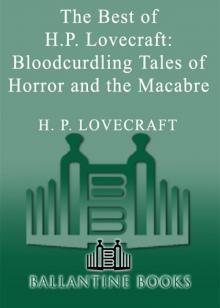 The Best of H.P. Lovecraft
The Best of H.P. Lovecraft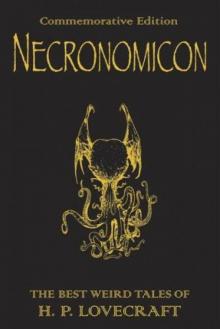 The Definitive H.P. Lovecraft: 67 Tales Of Horror In One Volume
The Definitive H.P. Lovecraft: 67 Tales Of Horror In One Volume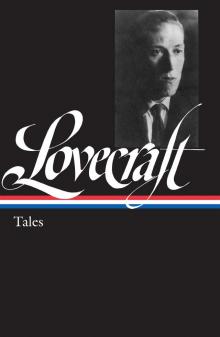 The Complete Works of H.P. Lovecraft
The Complete Works of H.P. Lovecraft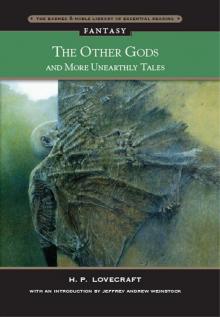 Other Gods and More Unearthly Tales
Other Gods and More Unearthly Tales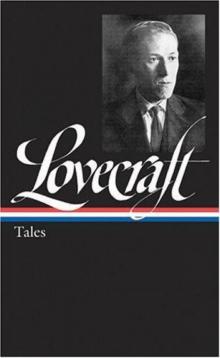 Lovecraft's Fiction Volume I, 1905-1925
Lovecraft's Fiction Volume I, 1905-1925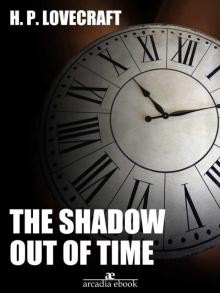 The Shadow Out of Time
The Shadow Out of Time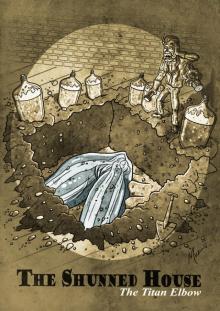 The Shunned House
The Shunned House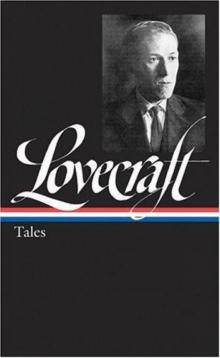 Lovecraft's Fiction Volume II, 1926-1928
Lovecraft's Fiction Volume II, 1926-1928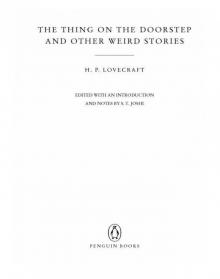 The Thing on the Doorstep and Other Weird Stories
The Thing on the Doorstep and Other Weird Stories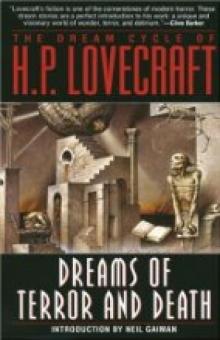 Dream Cycle of H. P. Lovecraft: Dreams of Terror and Death
Dream Cycle of H. P. Lovecraft: Dreams of Terror and Death Great Tales of Horror
Great Tales of Horror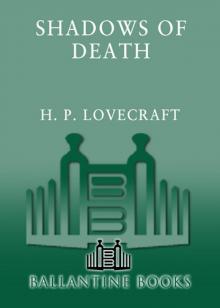 Shadows of Death
Shadows of Death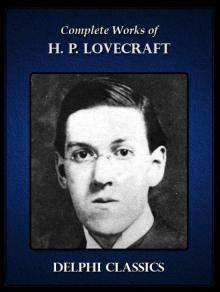 Delphi Complete Works of H. P. Lovecraft (Illustrated)
Delphi Complete Works of H. P. Lovecraft (Illustrated)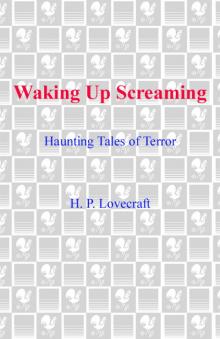 Waking Up Screaming: Haunting Tales of Terror
Waking Up Screaming: Haunting Tales of Terror H.P. Lovecraft Goes to the Movies
H.P. Lovecraft Goes to the Movies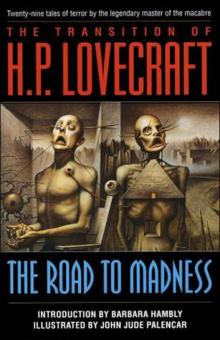 The Road to Madness
The Road to Madness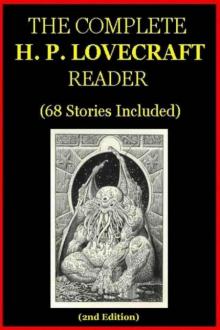 The Complete H.P. Lovecraft Reader (68 Stories)
The Complete H.P. Lovecraft Reader (68 Stories)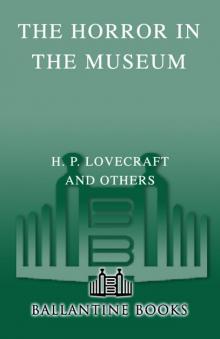 The Horror in the Museum
The Horror in the Museum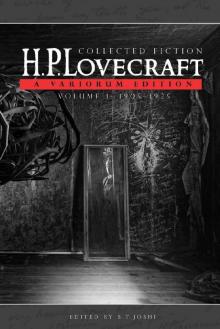 Collected Fiction Volume 1 (1905-1925): A Variorum Edition
Collected Fiction Volume 1 (1905-1925): A Variorum Edition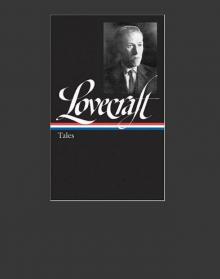 Lovecrafts_Fiction, vol.I_1905-1925
Lovecrafts_Fiction, vol.I_1905-1925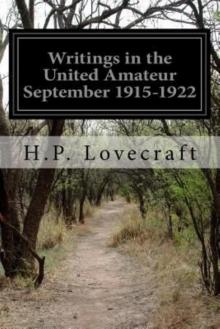 Writings in the United Amateur, 1915-1922
Writings in the United Amateur, 1915-1922 H.P. Lovecraft: The Complete Works
H.P. Lovecraft: The Complete Works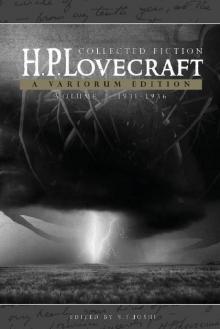 Collected Fiction Volume 3 (1931-1936): A Variorum Edition
Collected Fiction Volume 3 (1931-1936): A Variorum Edition H.P. Lovecraft: The Complete Fiction
H.P. Lovecraft: The Complete Fiction Collected Fiction Volume 2 (1926-1930): A Variorum Edition
Collected Fiction Volume 2 (1926-1930): A Variorum Edition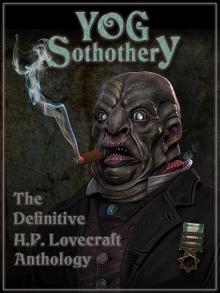 Yog Sothothery - The Definitive H.P. Lovecraft Anthology
Yog Sothothery - The Definitive H.P. Lovecraft Anthology The Complete H.P. Lovecraft Collection (Xist Classics)
The Complete H.P. Lovecraft Collection (Xist Classics)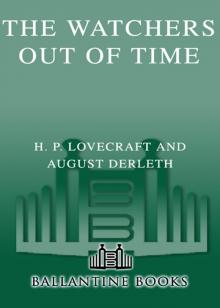 The Watchers Out of Time
The Watchers Out of Time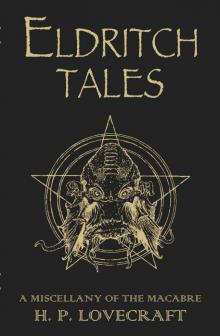 Eldritch Tales
Eldritch Tales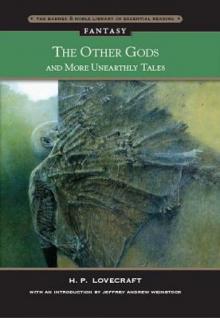 The Other Gods And More Unearthly Tales
The Other Gods And More Unearthly Tales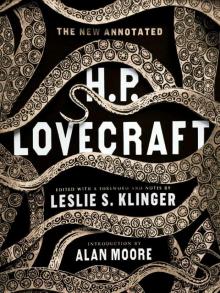 The New Annotated H. P. Lovecraft
The New Annotated H. P. Lovecraft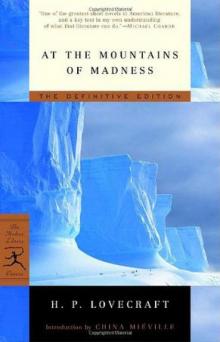 At the mountains of madness
At the mountains of madness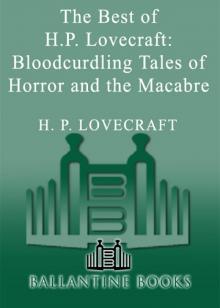 Bloodcurdling Tales of Horror and the Macabre
Bloodcurdling Tales of Horror and the Macabre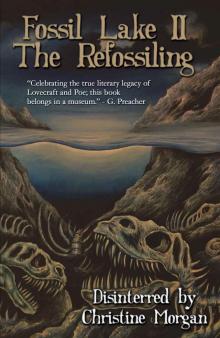 Fossil Lake II: The Refossiling
Fossil Lake II: The Refossiling Shadows of Carcosa: Tales of Cosmic Horror by Lovecraft, Chambers, Machen, Poe, and Other Masters of the Weird
Shadows of Carcosa: Tales of Cosmic Horror by Lovecraft, Chambers, Machen, Poe, and Other Masters of the Weird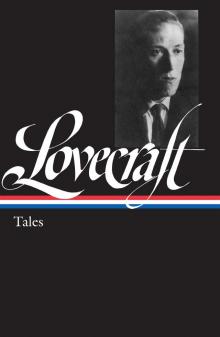 H. P. Lovecraft
H. P. Lovecraft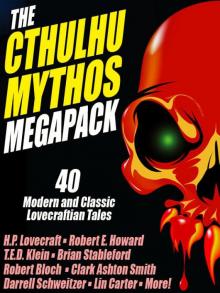 The Cthulhu Mythos Megapack
The Cthulhu Mythos Megapack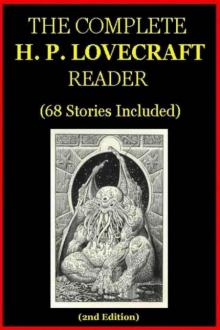 The Complete H. P. Lovecraft Reader (2nd Edition)
The Complete H. P. Lovecraft Reader (2nd Edition) The Complete Fiction
The Complete Fiction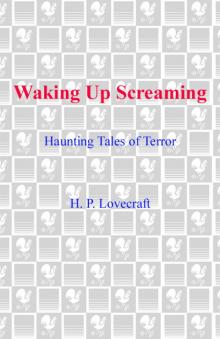 Waking Up Screaming
Waking Up Screaming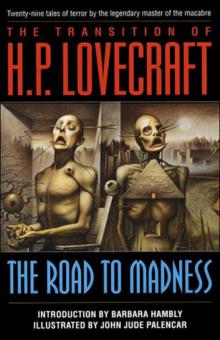 Transition of H. P. Lovecraft
Transition of H. P. Lovecraft![[1935] The Shadow Out of Time Read online](http://i1.bookreadfree.com/i2/04/12/1935_the_shadow_out_of_time_preview.jpg) [1935] The Shadow Out of Time
[1935] The Shadow Out of Time The Horror Megapack
The Horror Megapack